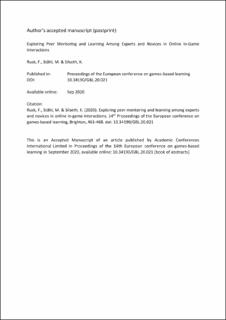| dc.contributor.author | Rusk, Fredrik | |
| dc.contributor.author | Ståhl, Matilda | |
| dc.contributor.author | Silseth, Kenneth | |
| dc.date.accessioned | 2021-03-16T11:18:05Z | |
| dc.date.available | 2021-03-16T11:18:05Z | |
| dc.date.created | 2020-09-11T09:43:42Z | |
| dc.date.issued | 2020 | |
| dc.identifier.citation | Rusk, F., Ståhl, M. & Silseth, K. (2020). Exploring peer mentoring and learning among experts and novices in online in-game interactions. 14th Proceedings of the European conference on games-based learning, Brighton, 461-468. doi: | en_US |
| dc.identifier.issn | 2049-100X | |
| dc.identifier.uri | https://hdl.handle.net/11250/2733607 | |
| dc.description.abstract | Becoming a competent player of online games involves complex processes and networks of online and offline life where the player is socialized into social norms and expectations. An important aspect of what constitutes gamers learning trajectories is guidance from experienced players. Games are public spheres where learning is social and distributed and where players often are enabled to learn new and advanced competencies. However, there is little educational research on how these competencies are cultivated and employed within a competitive gaming scene. In the current paper, we analyze the mentor-apprentice relationship between an expert and a novice in the multiplayer FPS CS:GO within an eSports and educational context. By assuming a dialogic approach to meaning making, we will examine how novices and experts uphold and talk the relationship into being and how the peer teaching and learning manifests in the in-game interaction. The ethnographic data was collected in collaboration with a vocational school with an eSports program in Finland in 2017-2018. Students (aged 17-18, all male) playing CS:GO shared screen recordings of their matches and took part in interviews. The participants play in two different teams. Here, we focus on Martin (expert) and John (novice) from team one. Martin was the highest ranked team member, something his team members are aware of and make relevant in interviews and in-game interactions. This position seems to provide him authority and leadership within the team. In the interviews, Martin aligns with being the leader and repeatedly mentions that he coached John to become part of the team. This relationship is also evident in the in-game data where Martin, together with the rest of the team, often provides feedback and support for John. The learning appears to be how to become competent in the game, and there are strong indications of other aspects of learning that relate to sociality and leadership. | en_US |
| dc.language.iso | eng | en_US |
| dc.publisher | Academic Conferences International Limited | en_US |
| dc.relation.uri | https://search.proquest.com/docview/2473444913?pq-origsite=gscholar&fromopenview=true | |
| dc.title | Exploring Peer Mentoring and Learning Among Experts and Novices in Online in-Game Interactions | en_US |
| dc.type | Peer reviewed | en_US |
| dc.type | Journal article | en_US |
| dc.description.version | acceptedVersion | en_US |
| dc.subject.nsi | VDP::Samfunnsvitenskap: 200::Pedagogiske fag: 280 | en_US |
| dc.subject.nsi | VDP::Teknologi: 500 | en_US |
| dc.source.pagenumber | 461-468 | en_US |
| dc.source.journal | Proceedings of the European conference on games-based learning | en_US |
| dc.identifier.doi | 10.34190/GBL.20.021 | |
| dc.identifier.cristin | 1828956 | |
